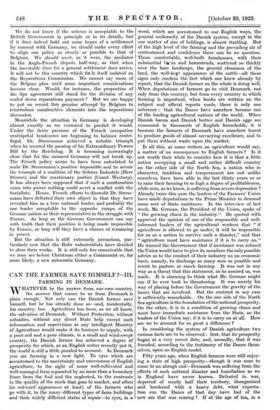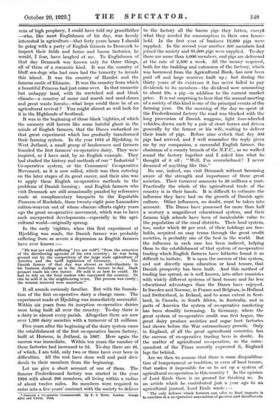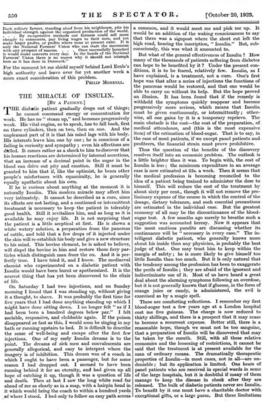CAN THE FARMER SAVE HIMSELF ?—III.
FARMING IN DENMARK.
WHATEVER be the answer from our own country, the answer that comes to us from Denmark is plain enough. Not only can the Danish farmer save himself, but he has already done so—and, incidentally, his country, too. Agriculture has been, as we all know, the salvation of Denmark. Without Protection, without subsidies, without any direct State help except such information and supervision as any intelligent Ministry of Agriculture would make it its business to supply, with a poor soil and a poor climate, in a small and wind-swept country, the Danish fanner has achieved a degree of prosperity for which, as an English writer recently put it, the world is still a little puzzled to account. In Denmark you see farming in a new light. To eyes which are accustomed to the uncertainty and unevenness of English agriculture, to the sight of some well-cultivated and well-managed farm separated by no more than a boundary fence from the foul and the neglected, to the contrasts in the quality of the stock that goes to market, and often (in outward appearance at least) of the farmers who go with it, to the many different types of farm buildings and their widely different states of repair—to eyes, in a word, which are accustomed to our English ways, the general uniformity of the Danish system, except in the one matter of size of holdings, is almost startling. But df the high level of the farming and the prevailing air of contentment and confidence there can be no question. Those comfortable, well-built farmhouses, with their substantial lams and homesteads, scattered so thickly over the bare landscape, the general cleanness of the land, the well-kept appearance of the cattle—all these signs only confirm the fact which one knew already by report, that the Danish farmer on the whole is doing well. When deputations of farmers go to visit Denmark, not only from this country, but from every country in which farming is important, when books are written on the subject and official reports made, there is only one inference : that the Danes have somehow become one of the leading agricultural nations of the world. When Danish bacon and Danish butter and Danish eggs are consumed in thousands of English households, it is because the farmers of Denmark have somehow learnt to produce goods of almost unvarying excellence, and to put them without waste upon the market.
Is all this, as some writers on agriculture would say, a matter of no consequence to English farmers ? Is it not worth their while to consider how it is that a little nation occupying a small and rather difficult country on the other side of the North Sea, a nation who in character, tradition and temperament are not unlike ourselves, have been able in the last thirty years or so to raise their farming to so high a degree of profitableness, while ours, as we know, is suffering from severe depression ? Already twice this year the leaders of the Farmers' Union have made deputations to the Prime Minister to demand some sort of State assistance. In the interview of last week, Mr. German, the President of the Union, spoke of " the growing chaos in the industry." He quoted with approval the opinion of one of the responsible and well- informed leaders of the agricultural workers that " if agriculture is allowed to go under, it will be impossible for us as a nation to survive such a disaster," and that " agriculture must have assistance if it is to carry on." He warned the Government that if assistance was refused the Union would have to give its members the only possible advice as to the conduct of their industry on an economic basis, namely, to discharge as many men as possible and resort to pasture or ranch farming. It was not in any way as a threat that this statement, so he assured us, was made. It is alarming to think what Mr. German might say if he ever took to threatening. It was merely his way of placing before the Government the gravity of the issues that are involved. But the contrast in any case is sufficiently remarkable. On the one side of the North Sea agriculture is the foundation of the national prosperity. On the other, it is in a condition of growing chaos and must have immediate assistance from the State, so the leaders of the Union say, if it is to carry on at all. How are we to account for so great a difference ?
In considering the system of Danish agriculture two curious facts are to be observed : first, that its prosperity began at a very recent date, and, secondly, that it was founded, according to the testimony of the Danes them- selves, upon an English model.
Fifty years ago, when English farmers were still enjoy- ing a state of high prosperity—though it was soon to come to an abrupt end—Denmark was suffering from the effects of such national disaster and humiliation as we in England have never known. Defeated in war, deprived of nearly half their territory, 'disorganized and burdened with a heavy debt, what expecta- tion can the Danes of that day have had of the new era that was coming ? If at the age of ten, in a vein of high prophecy, I could have told my grandfather —who, like most Englishmen of his day, was keenly interested in agriculture—that forty years hence I should be going with a party of English fiirmers to Denmark to inspect their fields and farms and bacon factories, he would, I fear, have laughed at me. To Englishmen of that day Denmark was known only for three things, all of them of a romantic kind. It was the country of bluff sea-dogs who had once had the temerity to invade this island. It was the country of Hamlet and the famous castle of Elsinore. It was the country from which a beautiful Princess had just come over. In that romantic but unhappy land, with its wretched soil and bleak climate- a country of moor and marsh and sand-dunes and great waste forests—what hope could there be of an agricultural revival ? You might almost as well look for it in the Highlands of Scotland.
It was in the beginning of those black 'eighties, of which the memory still hovers like some hateful ghost in the minds of English farmers, that the Danes embarked on that great experiment which has gradually transformed their farming system. In the year 1882 at Hjedding, in West Jutland, a small group of landowners and farmers founded the first farmers' co-operative dairy. They were inspired, as I have said, by an English example. They had studied the history and methods of our " Industrial " Co-operative system, or the Consumers' Co-operative Movement, as it is now called, which was then entering on the later stages of its great career, and their aim was to apply these English co-operative methods to the problems of Danish farming ; and English farmers who visit Denmark are still occasionally puzzled by references made at complimentary banquets to the Equitable Pioneers of Rochdale, those twenty-eight poor Lancashire cotton-weavers out of whose obscure efforts eighty years ago the great co-operative movement, which was to have such unexpected developments—especially in the agri- cultural world—originally sprang.
In the early 'eighties, when this first experiment at Hjedding was made, the Danish farmer was probably suffering from as severe a depression as English farmers have ever known :—
"He was not only suffering" (we are told') "from the extortion of the distributing agencies of his own country ; he was being ground out by the competition of the large scale agriculture of America and the tariff legislation of Germany. . . . The Danish farmer of that day was almost as individualistic in his business dealings as is the American farmer to-day. Each peasant made his own butter. He sold it as best he could. He had to rely on the food traders who canvassed the country. Or else he sold it in the neighbouring town. The process was costly ; the returns received were uncertain."
It all sounds curiously familiar. But with the founda- tion of the first co-operative dairy a change came. The experiment made at Hjedding was immediately successful. Within six years from its inception co-operative dairies were being built all over the country. To-day there is a dairy in almost every parish. Altogether there are now over 1,200 dairy societies with a turnover of 21 millions.
Five years after the beginning of the dairy system came the establishment of the first co-operative bacon factory, built at Horsens, in Jutland, in 1887. Here again the success was immediate. Within ten years the number of these factories had increased to 25. To-day there are 46, of which, I am told, only two or three have ever been in difficulties. All the rest have done well and paid divi- dends to their members from the beginning.
Let me give a short account of one of them. The famous Frederikssund factory was started in the year 1894 with about 500 members, all living within a radius of about twelve miles. Its members were required to enter into a five years' contract with the society to deliver • • Denmark a Co-operative Commonwealth. By F. C Howe. London George Allen and Galvin. 1522. to the factory all the bacon pigs they fatten, except what they needed for consumption in their own house- hold. In the first year of business 12,000 pigs were supplied. In the second year another 500 members had joined the society and 81,000 pigs were supplied. To-day there are more than 4,000 members, and pigs arc delivered at the rate of 2,500 a week. All the money required, both for the building and extension of the factory, which was borrowed from the Agricultural Bank, has now been paid off and large reserves built up ; but during the thirty years of its existence it has never failed to pay dividends to its members—the dividend now amounting to about 10s. a pig—in addition to the current market price. It is not surprising to hear that the annual meeting of a society of this kind is one of the principal events of the farming year. On the morning of the day we spent at the Frederikssund factory the road was blocked with the long procession of Danish waggons, light four-wheeled vehicles, drawn each by a pair of stout horses and driven generally by the farmer or his wife, waiting to deliver their loads of pigs. Before nine o'clock that day 500 pigs had arrived, and I well remember the reply given me by my companion, a successful English farmer, the chairman of a county branch of the N.F.U., as we walked round the factory together and I asked him what he thought of it all : " Well, I'm overwhelmed 1 I never dreamed of anything like this."
No one, indeed, can visit Denmark without becoming aware of the strength and importance of these great societies. Their turnover amounts to 50 millions a year. Practically the whole of the agricultural trade of the country is in their hands. It is difficult to estimate the influence they have had on the growth of Danish agri- culture. Other influences, no doubt, must be taken into account. The Danes have possessed for more than half a century a magnificent educational system, and their famous high schools have been of incalculable value to the population of the rural districts. Their land system, too, under which 90 per cent. of their holdings are free- holds, acquired on easy terms through the great credit societies, is probably one of the best in the world. But the influence in each case has been indirect, helping them to the establishment of that system of co-operative trading which English farmers have hitherto found it so difficult to imitate. It is upon the success of this system, and not directly upon education or land tenure, that Danish prosperity has been built. And this method of trading has spread, as is well known, into other countries with widely different systems of land tenure and far less educational advantages than the Danes have enjoyed. In Sweden and Norway, in France and Belgium, in Holland and Switzerland, in Ireland, and to some extent in Scot- land, in Canada, in South Africa, in Australia, and in parts of America the system of co-operative marketing has been steadily increasing. In Germany, where the great system of co-operative credit was first begun, the great dairy produce societies and sugar beet factories had shown before the War extraordinary growth. Only in England, of all the great agricultural countries, has the success of co-operative trading been in doubt. In the matter of agricultural co-operation, as the corre- spondent of the Times recently expressed it, England lags far behind. Are we then to assume that there is some disqualifica- tion of temperament or tradition, or even of land tenure, that makes it impossible for us to set up a system of agricultural co-operation in this country ? In the opinion of Lord Ernle there is no ground for thinking so. In an article which he contributed just a year ago to an agricultural journal, Lord Ernle wrote :— " The only defence which farmers can offer to food imports is to combine in a co-operative association of growers and distributors.
Each solitary farmer, standing aloof from his neighbours, pits his individual strength against the organized production of the world. . . . By co-operative methods our farmers could sell more cheaply to consumers, pay living wages to their men, and yet make larger profits. or profits where none at present exist. It is only the National Farmers' Union who can start the movement with any prospect of success. . . . Once successfully launched it would make converts every day. In the hands of the National Farmers' Union there is no reason why it should not triumph here as it has done in Denmark."
For the moment let me shield myself behind Lord Ernie's high authority and leave over for yet another week a more exact consideration of this problem.
PHILIP MORRELL.












































 Previous page
Previous page